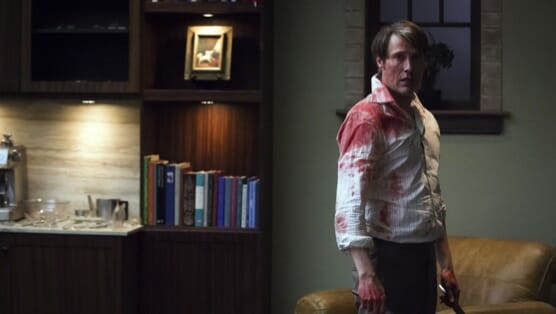Hannibal: “Mizumono”
(Episode 2.13)

“Mizumono” might just be the most perfect hour of television I’m likely to see all year. Walking around after the final image cut to black, I found myself feeling a strange, vacillating mixture of hardcore adrenaline and physical numbness. It’s a feeling I’ve experienced only a handful of times in my life, each time indicating that I’d seen something that thoroughly blew me out of the water. “Mizumono” finds everyone involved in the show at the top of their game and firing on all cylinders. It’s an incendiary, bloody end to a profound season of television.
Much like last season, the first half of this batch of episodes presented itself as a more straightforward, case-of-the-week crime drama. Around the time the Vergers were introduced, however, the show began to get a little more loosey-goosey with its structure, disregarding an external, plot-based narrative in favor of an internal, character-based one. Rather than presenting us with scenes of the team investigating various crimes, we were treated to a series of unsexy sex scenes, extended conversations filled with heady aphorisms concerning human nature and Michael Pitt gloriously hamming it up as Mason. While the first year’s descent into this more dreamlike style dovetailed nicely with Will’s hypnosis at Hannibal’s hand, the motivating factor for such a sensibility this season appears to be Will’s ever-deepening relationship to Hannibal. In getting close to someone so evil and warped, Will’s entire sense of reality appears to be adjusting itself accordingly.
Such an elliptical, fever dream-esque approach has subsequently led to large logic gaps that are still not addressed in this final installment. In particular, how Will managed to gradually convince everyone that Hannibal was the actual Chesapeake Ripper—despite having little-to-no evidence beyond his word—never entirely made sense to me. Considering that Jack goes from firmly believing in Will’s guilt to recklessly putting his life and career on the line to capture the cannibalistic doctor, such a development does not feel like something that should just be glossed over. Then again, Hannibal has always been a show prone to restraining important chunks of information, and most of the latter half of the season works in spite of this plot hole.
-

-

-

-

-

-

-

-

-

-

-

-

-

-

-

-

-

-

-

-

-

-

-

-

-

-

-

-

-

-

-

-

-

-

-

-

-

-

-

-








































